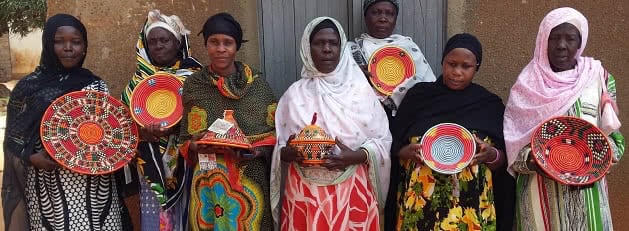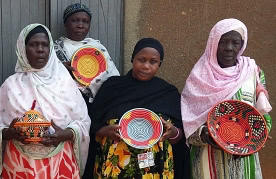Government decrees to don a mask and “be economical” are not much help for the large number of working poor people in Uganda who have lost their incomes and depleted any savings since the COVID-19 crisis began. A growing movement of home-based worker organizations have sent a strong, unified message to government about what will help.

The vast majority of Uganda’s labour force — 94% — works informally and these workers have little protection. Among the most invisible are those who produce, often in cooperative groups, from their homes for local and export markets.
These workers stitch garments and shoes, weave baskets, make popular crafts, assemble electronics, and grow and prepare food to earn our livelihood, says the statement sent by a collective group of 19 home-based worker associations that have joined forces to share strategies in these bad times.
Like home-based workers in much of the world, they have long been invisible and overlooked, and their important contributions to the economy, to supply chains and to communities are often overlooked. For example, baskets that are exported to international markets, bringing money into the Ugandan economy. Those international buyers, however, vanished months ago as news of the coronavirus began to spread. Home based workers lost contracts and their livelihoods.
Although many have started growing food in their local gardens to feed their families, the situation continued to worsen. While earnings declined precipitously, prices increased. Those with savings used them; those who belonged to groups with collective savings schemes helped each other. But most of those have been spent, and expenses have risen, and debt loads are heavy. Even the remaining local customers have started paying less because they know the home based workers are desperate.
Government emergency relief, they say, has been inadequate and spotty.
Realizing that collective action was needed, leaders from 19 home-based worker associations and self-help groups got together on WhatsApp in early April to talk about the challenges and share ideas. They agreed to keep talking, and soon developed a unified list of their shared issues and needs. This led to the creation of a joint statement, sent this week to all levels of government.
After detailing the dire situation and reminding governments of their responsibility to workers who contribute to Uganda, home based workers have articulated what they need government to do. Their demands include:
- Health and safety measures, from masks and sanitizer to reduce the growing danger from gender-based violence
- Income & food security measures, including sick pay for informal workers, access to credit and interest-free loans, more support for urban agriculture and fair contracts for home-based workers to sew masks and scrubs
- Communication and information enhancements like reducing the costs of electricity, information technology, devices and internet taxes to make information exchange more affordable, and support with connections to help women escape domestic violence
- Education support to improve schooling, including home-schooling, opportunities among the vulnerable poor.
While the statement is clear and the demands are concise and achievable, governments have yet to respond to the groups.
Read the Open Statement about Impacts of Covid 19 Pandemic on Home Based Workers in Uganda.
